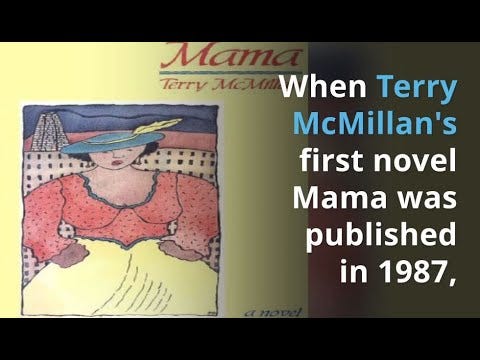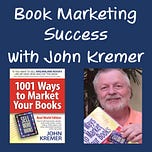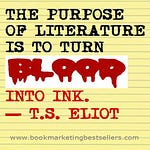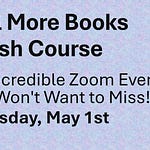Today I want to talk a little bit about what really matters in marketing a book. And I'm going to do it by telling a story that I've told before, but apparently people haven't gotten the message. So I want to tell it again.
It's a story about Terry McMillan, now a bestselling novelist who had several movies done with Waiting to Exhale and How Stella Got Her Groove Back.
But her first novel was published by a large New York publisher, but they didn't do much with it. This was in 1987. They sent out press releases. They sent out some review copies. But Terry was a first-time novelist, so media didn't care. Nothing much happened.
The publisher did their normal low-level promotion for first-time authors. So Terry decided that she would take her promotion of the book into her own hands.
What she did, the thing that really is vitally important for all of you to hear, and I hope you'll actually take it to heart, was simple: She wrote 3,000 letters. Actually, more than 3,000 letters. She wrote them to bookstores, college stores, chain stores, African-American groups, college professors, other groups, all asking them to either stock her book or promote her book.
Now, this was before the internet. If she were to do promotion in today's world, she probably would have asked bloggers and podcasters, social networked with others, and creating Youtube videos.
What she did, however, was write 3,000 letters to the key audiences for her book. She offered to do readings wherever they would give her space and she'd be happy to give a talk. She would ask different actions of them depending on what audience she was addressing at the time
Again, she wrote 3,000 letters.
The response was so great that she ended up doing a 39-city book tour. Her efforts gained her plenty of rave reviews for her book as well as two reprintings in six weeks. That's a major success for a first-time novelist.
Her publisher got behind her once they saw that the book was selling, and it was worth reprinting again and again.
The key point to this story is not who Terry sent letters to, but how many letters she sent. It's a numbers game, and what happens with most authors, even though I've told them this story many times, is that they ignore this crucial advice.
Write a lot of emails.
Write a lot of letters.
In today's world, I would have at one point told you to send out emails to people, but my experience in the last six months is that emails don't do the job. People aren't reading their emails anymore. So you should send out real letters via the post office.
Obviously, it takes time to write 3,000 letters. It takes a lot of time to write even 100 letters.
Now, most of the letters can be the same thing. Or if you're writing a postcard, it's just a short little scribbled note on the postcard to your directed audience asking them for something specific.
You should write 3,000 letters. That is the most important thing you can do in marketing a book. Nothing else can replace that personal attention from you to people that could have an influence in the marketplace, who could potentially bring your book to the readers you want to reach.
Again, write to bookstores, college professors, African American groups, in Terry's case, other groups that you might want to reach out to depending on what kind of book you've written.
Now, she promoted a first-time novel. I want to encourage you, every novelist, especially first-time or second-time novelists, to take this advice to heart.
Write letters. Write 3,000 of them.
If you write 10 letters a day, it'll take you about a year to write 3,000 letters. If you write 30 letters a day, it will only take 100 days. And, if you take some time off for good behavior, it would take you about four, maybe five months.
If you wrote 50 letters a day, obviously, it would go much quicker.
Maybe you could get your friends involved with this so that it's not just you writing letters. They could help you write some of the letters or stuff the envelopes and put on the stamps.
And again, your letters have to be handwritten. Escept if you did a postcard, it should be handwritten.
In today's world, you might be writing to bloggers as well, bloggers who write about books like yours, review books like yours, interview authors like you.
Sent letters to podcasters as well—podcasters who might be very happy to interview a new first-time author or second-time author.
Writing letters is really a strategy that even applies to people who have published 10 or 20 books.
When you're launching your new book, really think about writing a lot of letters. Take it to heart. Do more promotions. Write to the people that you think could make a difference in your book—even if it's only 10 letters a day,
It's going to take you a long time to write 3,000 letters. That is a year's worth of time if you write every day 10 letters.
Make your letters personalized. Even a handwritten note even on those letters would be worthwhile. You can easily customize 20 or 30 letters a day if you take a half hour to an hour to set aside to promote your book.
It's a numbers game. It really does matter.
I know this is not an easy ask. I know that it's hard to write that many letters. I know it's hard to find that many addresses. I know it's not an easy thing at all. But it's the most important thing you could do to promote your book.
Terry’s novel Mama did not become a New York Times bestseller, but Waiting to Excel and When Stella Got Her Groove Back become bestsellers and movies.
But Terry had to start somewhere. She was a first-time novelist. Mama, that was her book. That was the novel that she wrote. That is the one that she chose to promote right from the beginning. She was a 36-year-old first-time novelist. She was trying to reach out to people who could make a difference with her book. In her case, that was bookstores, colleges, African-American groups, and other groups that she thought could help to promote her book.
In today's world, that list would also include podcasters, bloggers, people with websites that address an audience you want to reach out to. It might be people that do YouTube book reviews. You might reach out to social media influencers that might make a difference, reach out to them, write them a letter.
I would, if I could, try to get people's addresses and send out a letter, a physical letter that will have much bigger impact in today's world. It's hard to ignore a beautiful postcard or a handwritten letter hand-addressed to that person.
That can make a big difference. So try it.
Maybe you can't do all 3,000. Maybe it becomes overwhelming. So start with 300.
300 you can easily do in a month. Once you've done that, the next month, do another 300. And the next month, do another 300. And pretty soon, you'll have reached 3,000 people.
It really is a numbers game.
It really does make a difference how many people you reach out to.
It's not a simple thing of emailing somebody and going, oh, okay, they didn't respond and that's it. And I did it to 10 people. Or I made phone calls to 10 people and I didn't get through, so I gave up trying to reach out.
It doesn't work. You have to reach out. It's hard. Absolutely. It is very hard. But writing your book was also hard. Getting it published was also hard. Formatting it, editing it, getting cover design, working with a publisher, working with a publicist, etc. All of that is hard.
Some people have spent five or ten years writing a book, and then they don't want to spend a year promoting that book. Why not? Is your book important to you?
If it's important to you, do the work. And I know it is work. It's hard work.
Now I'm going to give you one little tip. It's a sort of selfish tip on my part, because if you want to reach 950 independent bookstores, I have a database of those bookstores. And I'll sell it to you for $50, really cheap. But it'll give you your first 950 stores to reach out to with addresses, phone numbers, emails, social media, people's names. You can order it here: https://bookmarketingbestsellers.com/top-900-independent-bookstores.
Now I didn't do this video to sell that database. I did this video because I really want you to succeed. I want you to create an impact with your book, whether it's your first book, your second book, or your tenth book.
It's a numbers game. You really have to reach out to people and knock on their doors. Terry did it with 3,000 letters. You can do it with 3,000 letters and it's worth doing. It really is worth doing.
It could make the difference between you having the opportunity to write a second book or a third book or really get the notice that your book and you deserve.
But you have to put the work in. I'm not going to sugarcoat it.
I'm telling you now, if you've watched this video, and you've listened to it, please take it to heart.
Contact 3,000 people. Write 3,000 letters.
It'll make a difference in your world.
It'll make a difference for your book.
It'll make a difference for you and your authority as an author.
It could set you up as an expert. It could make a big difference.
Besides writing letters as Terry did to bookstores, colleges, and other groups, write letters to major newspapers, book review sections. You can get their free addresses at https://bookmarketingbestsellers.com/newspaper-book-review-editors. That's free. There's about 50 newspapers there with their addresses and you can just say, attention book review editor.
You can do the same with Google searches to discover the key magazine editors you want to reach out to, TV producers you want to reach out to, radio producers you want to reach out to.
There are over a thousand live local radio shows every day in the United States). These radio shows are looking for people to interview, interesting people to interview. An author is almost inevitably an interesting person to interview.
So you have bookstores, you possibly have colleges, you have groups you want to target, blogs, podcasts, radio shows, TV shows, magazines, newspapers.
The world is open to you, but you have to knock on the door to get it answered.
Write those 3,000 letters. Start today.
Source: https://bookmarketingbestsellers.com/the-mama-bestseller-video.













Share this post